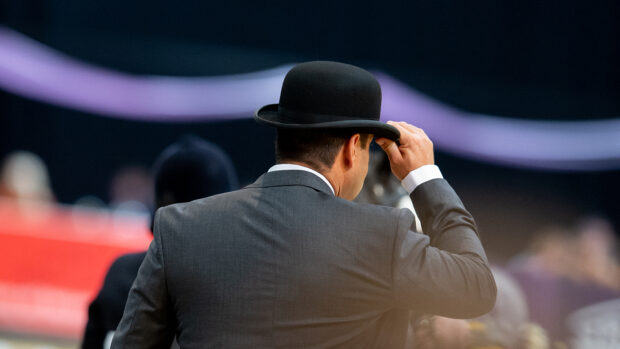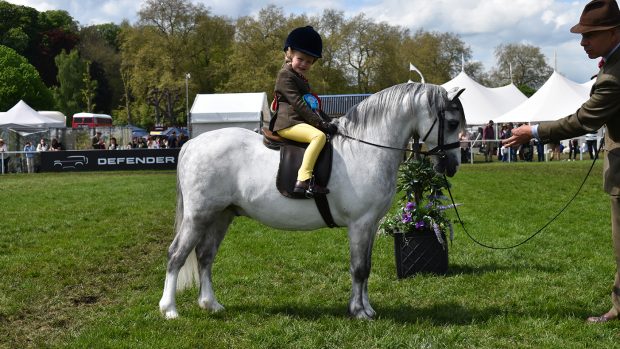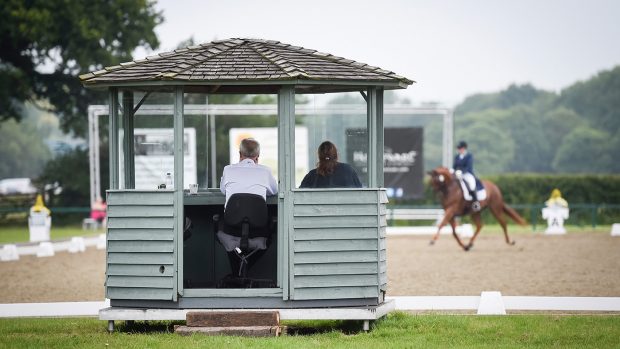With more combinations riding down the centre line than ever before, there has never been a better time to become a British Dressage (BD) judge.
Even if you don’t intend on embarking fully on a judging career, becoming a dressage judge is a good way to improve your understanding of the horse’s way of going.
 Watch the video
Watch the videoYou might find this a rewarding process in itself, but it can also significantly benefit your own test riding and coaching.
However, if you want to progress up the levels, or lists, it can take years and involves extensive training and assessment.
Still interested? We’ve broken it down below into a step-by-step guide starting with the most basic requirements.
Where do I start?
To become a trainee judge you first need to be a minimum of a full (non-competing) member with BD – learn more about BD memberships.
Once you’re signed up, you can complete the registration to become a trainee judge through your online profile. It will cost £15 to register and your registration will be valid for 12 months.
Once you’ve registered BD will contact you with further information about booking an induction session. The induction session must be completed within the first year of your registration.
Once you’ve attended an induction session, you’ll have the option to make your details visible on BD’s find a judge database. You can browse that database even as a non-member to get a feel for the system.
As a trainee judge, who has completed the induction, you can start judging at unaffiliated competitions. You’ll have to renew your £15 registration annually and attend an annual seminar. Every two years you’ll also have to take an induction session to keep up to date.
You can also now register for the judge education system for £30. This is the pathway to judging at affiliated competitions and becoming a listed judge.
How do I become a listed dressage judge?
You have two years to become listed once you’re registered to the judge education system.
As a trainee judge, you will be following the “new judge” pathway. This will include attendance at interactive workshops and completion of self-directed learning activities, including:
- sitting in for a minimum of 30 horses with two different judges
- writing for a minimum of 20 horses with two different judges
- completing 20 practice tests, with 10 tests being reviewed by a tutoring judge
- observing two training sessions of a minimum of two hours each
That might seem like a lot to organise, but BD has a self-directed learning guidance document which will help you reach out to local judges.
To be eligible to take the final online assessment, candidates must have completed all of the above pathway tasks and have achieved three scores at 62% or above at novice level or three scores at 65% or above at BD freestyle affiliated competitions.
Candidates must begin at novice level unless they’re eligible for the fast-track scheme. The fast-track scheme is available for riders who have at a minimum ridden at advanced medium at National Championships level achieving four scores of over 68%.
What are the different lists?
The lists which dressage judges progress up range from six to one, and each enables you to judge different classes.
List 1 qualifies you to judge tests of all levels of dressage, including young horse qualifiers and eventing tests.
List 2A all dressage tests up to and including inter I.
List 2 all tests up to and including PSG and young horse qualifiers.
List 3A all tests up to and including advanced medium.
List 3 all tests up to and including medium, you’ll also be eligible to become a para judge.
List 4 all tests up to and including elementary, plus intermediate level or below eventing tests.
List 5 all tests up to and including novice, plus novice level or below eventing tests.
List 6 intro and prelim tests, BE100, BE90 and BE80 tests as well as riding club tests up to and including novice, except when used as a qualifier.
Once you’re a listed judge the process to go up a list is similar to becoming listed in the first instance. But to come forward for re-assessment you must have been registered at your current level for one year.
How much do dressage judges earn?
Being a dressage judge is, in most cases, not an alternative to full-time employment.
Lists one to four earn £1.50 per starter at most BD competitions. Lists five and six earn £1.25 per starter.
This rate increases to £2.00 per starter at High Profile Shows, Premier Leagues and National Championships.
Judges also invoice for their travel expenses on top of this.
How else can I get involved?
It takes more than judges to run dressage competitions. The sport wouldn’t be able to continue without its strong network of volunteers. Being a writer for a judge is one essential volunteering role. Writers sit alongside judges, recording their scores and observations. Becoming a writer is an excellent way to learn more about dressage, and to experience the sport from the best seat in the house.
If you’re interested you can reach out to BD’s training and education team or get in touch with your local competition venue.
You might also be interested in:

‘Exciting changes ahead’: British Dressage announces new tests for 2024

Do you know CDI3*s from your CDI5*s? Horse & Hound’s guide to international dressage

Subscribe to Horse & Hound magazine today – and enjoy unlimited website access all year round
Horse & Hound magazine, out every Thursday, is packed with all the latest news and reports, as well as interviews, specials, nostalgia, vet and training advice. Find how you can enjoy the magazine delivered to your door every week, plus options to upgrade your subscription to access our online service that brings you breaking news and reports as well as other benefits.




